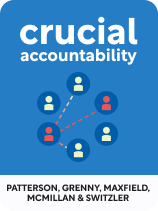

This article is an excerpt from the Shortform book guide to "Crucial Accountability" by Kerry Patterson, Joseph Grenny, et al.. Shortform has the world's best summaries and analyses of books you should be reading.
Like this article? Sign up for a free trial here .
Do you always follow up after having an important discussion? What is the most effective follow-up strategy?
The book Crucial Accountability teaches that an effective follow-up strategy is just as important as having an accountability conversation. If you don’t follow up with an action plan after a difficult conversation, then you will lose any progress you’ve made.
Learn how to follow up and create a follow-up plan below.
Create an Effective Follow-Up Plan
After you’ve successfully discussed an accountability issue and determined a solution, the authors of Crucial Accountability recommend creating a plan of action and then following up to ensure that everyone follows the agreed-upon plan. The plan of action is the first step in practicing an effective follow-up.
While this step seems pretty straightforward, don’t underestimate its importance; leaving the plan of action and follow-up vague could undermine the hard work and planning you put into preparing for the effective follow up conversation and developing a solution.
Determining Who Does What and When
The first part of creating a plan of action is identifying the specific tasks that need to be completed, who needs to do them, and when they need to be done. For example, if the agreement is that the other person will work on being more creative, you might say: “I want you to come up with three new ideas for how to market our product each week by noon on Friday.” Being specific is the an important aspect of effective follow up.
The authors especially emphasize the importance of being clear about who will complete each task. Avoid using vague statements like “let’s come up with three new ideas.” Terms like “let’s” and “we” undermine accountability. If one person is required to complete the task, make it clear that they are the one responsible.
They also advise that you be specific when naming deadlines. Statements like “complete it by next week” or even “by the end of next week” are too vague. Set an exact date and time: “Please have it done by Friday at noon.” This removes any room for misinterpretation.
Once it’s clear what needs to be done, who needs to do it, and when, check for understanding—ask if there are any questions about specifics such as quality, quantity, characteristics, or anything else the other person might be confused about.
(Shortform note: Experts second the authors’ argument here, explaining that the three things necessary for an employee to effectively complete a task are clear goals, detailed parameters, and accurate deadlines. No matter how self-sufficient, responsible, or hard-working someone is, they can’t effectively meet expectations without certain structures and boundaries.)
Following Up
After determining the plan of action, the authors assert that you must determine when and how to follow up on the results. While you don’t want to make the other person feel micromanaged, you also don’t want to take an entirely hands-off approach. To determine how soon after the conversation you need to follow up and the appropriate frequency and method, consider the following questions:
1) How important or risky is the task: If the task is very important or complicated, you should closely monitor the situation by following up soon after the discussion.
2) Can you trust that they will perform the task well? If the other person has not proved reliable or has little experience, you may need multiple follow-ups throughout the process to check on their progress.
However, if the other person has a fairly good track record or they’re experienced in the area, your follow-up approach can be less aggressive. Rather than planning an exclusive meeting, you can practice effective follow up during a routine interaction, for example. Furthermore, if the task is routine and the person is reliable, you can have them initiate the follow-up. For example: “when you’ve completed the outline for the project, send me a message and we’ll schedule a time to meet.”
| How to Know if You’re Micromanaging The author’s recommendations in this section are aimed at effectively following up without micromanaging. However, even if we don’t intend to micromanage, we might not realize when we’re doing it. People who micromanage are likely to follow up on accountability issues too aggressively because regardless of how simple the task is or how trustworthy the other person is, they hold the underlying persistent belief that they’re the only ones who can complete the task perfectly. Experts explain that the following behaviors are manifestations of this underlying belief and indicate that you might be a micromanager: 1. You don’t like to delegate work to other people because you do it best yourself. 2. You always ask employees to check with you before making a decision. 3. You prefer to be CC’d on every email. 4. You have a high employee turnover. 5. You’re rarely satisfied with deliverables. 6. Most of your employees have a hard time meeting deadlines. 7. You want everything done following rigid guidelines with no room for creativity. 8. You’re constantly focused on the efficiency of employees and want to know what they’re working on and when. 9. You frequently re-do or majorly edit an employee’s work. 10. You tend to think that employees rarely take initiative or be creative. If you recognize yourself frequently enacting more than one or two of these behaviors, consider that you might not be accurately assessing the risk of the task at hand, the other person’s responsibility, and their capability. |
Exercise: Create a Plan
When you’ve finally finished the conversation, you must make a plan of action and set a time to follow up to ensure that commitments are followed through on. How you approach the follow-up, though, depends on the situation.
Think of a recent accountability problem you’re having with an employee, coworker, or someone in your personal life. How has this person been failing to meet your expectations? For example, maybe you’ve noticed lately that a coworker, who usually does a great job, has been overlooking details and thus adding to your responsibilities, as you’re the one who then has to catch these details.
- What would your plan of action look like to solve the problem? Be sure to identify the who, what, and when of your plan.
- Now consider how you might follow up on your action plan. Think about the factors discussed above—how reliable and experienced is the other person? What is their track-record on following through with commitments? How complicated is your request? Are there any deadlines involved?

———End of Preview———
Like what you just read? Read the rest of the world's best book summary and analysis of Kerry Patterson, Joseph Grenny, et al.'s "Crucial Accountability" at Shortform .
Here's what you'll find in our full Crucial Accountability summary :
- How to broach sensitive conversations with loved ones and coworkers
- How to prepare for, execute, and follow up on accountability conversations
- How to solve issues while improving your relationships






